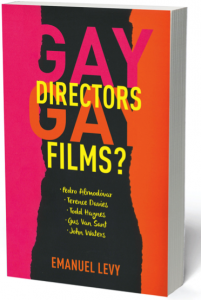Gay Subtext and Gay Reading of Mainstream Movies
Bette Davis, Anne Baxter, Thelma Ritter, Celeste Holm, George Sanders, and Gary Merrill 20th Century Fox
Trailer:
All About Eve, the Best Picture Oscar winner of 1950, is defined by the sensibility of Joseph L. Mankiewicz, a heterosexual (in fact, womanizer) writer-director.
Yet, the film and its star, Bette Davis, have been championed by gay viewers. elevating the film to both high camp and iconic status.
The whole film is stamped with an insider-gay atmosphere, both in text and subtext.
The most loyal viewers have been educated gay males, who must have related to the text’s self-contained theatrical milieu, smart dialogue (with memorable lines), and sharp acting by a terrific ensemble (the film scored 5 acting nominations, winning one for George Sanders).
As other critics have noted, the passing of time has only made All About Eve seem even more alert, cleverer, and more entertaining.
Some have even suggested that All About Eve could be done with an all-male cast, without losing any of its bite.
(The same can be said about Stage Door, The Women, Auntie Mame, and Who’s Afraid of Virginia Woolf? and Travels With My Aunt)
Some scene are more resonant than others with their double-entendres.
When Margo finds out that her lover-director Bill is going to Hollywood to do a picture Under Zanuck, the head of Fox (which produced All About Eve), she throws a tantrum, accompanied by a throwaway gay line: “Zanuck, Zanuck, Zanuck–what are you too, lovers?
He replies: “Only in some ways.”
Then there is the character of the acerbic critic, Addison DeWitt (played with panache by George Sanders, a hetero actor who won the Best Supporting Actor Oscar).
The witty and bright DeWitt–“that venomous fishwife”–is seen by some as a more typical character that the gay British actor Clifton Webb could and should have played.
In fact, Zanuck and Mankiewicz considered Webb for the part, after the latter excelled himself in the 1944 Laura (another movie that could be remade with an all-male cast).
Webb was extremely popular star at the time, striking box-office gild for Fox in his Mr. Belveder comedies (Cheaper by the Dozen)
DeWitt is an incorrigible aesthete, who expresses himself in an Oscar Wilde mode.
DeWitt’s self- loathing, declaring at one point his “inability to love and be loved,” represented a typical view of some gay men as they saw themselves–and were seen by the larger society. This was a stereotypical attitude that would prevail up to and including The Boys in the Band, the 1968 play and the 1970s version of it.













